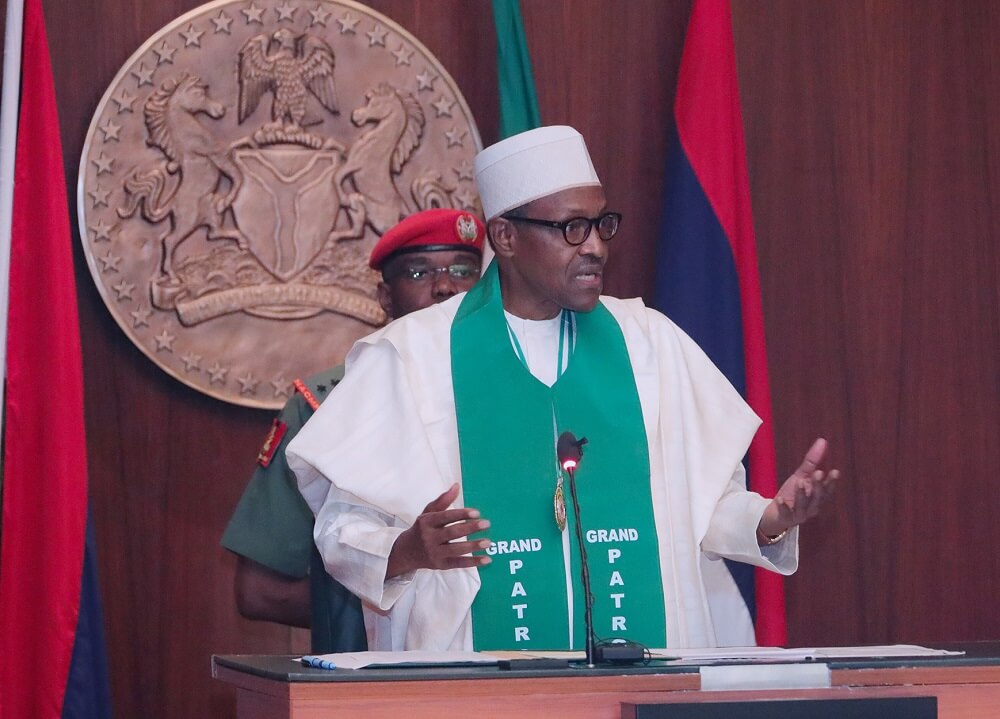15 things Buhari said at the Corruption Risk Assessment Training in Abuja
President Muhammadu Buhari has called on heads of anti-corruption agencies in Africa to adopt fresh measures that will prevent corrupt acts through risk assessment strategies. Mr Buhari gave the advice on Monday at the State House conference centre, Abuja, when he declared open a training programme on Corruption Risk Assessment (CRA) for heads and senior […]

President Muhammadu Buhari
President Muhammadu Buhari has called on heads of anti-corruption agencies in Africa to adopt fresh measures that will prevent corrupt acts through risk assessment strategies.
Mr Buhari gave the advice on Monday at the State House conference centre, Abuja, when he declared open a training programme on Corruption Risk Assessment (CRA) for heads and senior officials of Anti-Corruption Agencies in the African Union.
Here are 15 things Buhari said at the event:
1.The training is at the instance of this Administration as part of our support for the war against corruption in our continent and it is being facilitated by the Anti-Corruption Academy of Nigeria (ACAN) the research and training arm of the Independent Corrupt Practices and Other Related Offences Commission (ICPC).
2.The fight against corruption is a battle for the souls of our different countries and it is one that we must win. Since independence our continent has suffered from the severe consequences of corruption and it is imperative that we take steps to reverse the trend.
3.When we assumed office in May 2015, the pervasive nature and devastating impact of corruption on the Nigerian nation had become dysfunctional. The momentum for our electoral victory could not be separated from the revolt of the people against glaring endemic corruption.
4.During the past several months, we have been taking steps to institute integrity and transparency in the processes of government and holding those who have plundered our commonwealth to account for their actions.
5.However, the costs of recovery and sanctions are also enormous. While commendable successes have been recorded, it has become manifest that corruption fights back. With enormous stolen resources elements have attempted to compromise law enforcing institutions and pervert the course of justice.
6.This realization highlights the necessity of building a system that focuses on preventing corruption. We continue to implement policies aimed at building resilient systems that can withstand assault by corrupt officials.
7.Our steps in this direction include the full implementation of both the Treasury Single Account (TSA) and the Bank Verification Number (BVN) the Open Government Partnership, various Executive Orders, strengthening the Anti-Corruption Agencies and permitting their full autonomy.
8.It is in this context of building robust preventive systems that we must understand this initiative which aims to train leaders of anti-corruption agencies in the African Union by deploying Corruption Risk Assessment Methodology for corruption prevention in our countries.
9.Corruption Risk Assessment seeks to identify corruption-prone processes and procedures in organisations and recommend appropriate remedial steps. The methodology places a premium on prevention as an effective complement to enforcement in the war against corruption.
10.In 2016, through support from the United Nations Development Programme, UNDP, the Anti-Corruption Academy of Nigeria acquired the capacity to conduct training on Corruption Risk Assessment. Since then, the Academy has conducted a number of these trainings.
11.To showcase the growing appreciation of CRA as a tool for preventing corruption, the Anti-Corruption Academy of Nigeria has received a request for the training of Corruption Risk Assessors for ECOWAS countries from the ECOWAS Commission in Abuja.
12.Therefore, the training starting today is an opportunity to extend the benefits of this methodology to other African countries and by which it is clear that we have not taken our appointment as Anti-Corruption Champion for the continent for the year 2018 lightly.
13.It is heartwarming that most of our countries have subscribed to not only the United Nations Convention against Corruption, UNCAC, but also the African Union Convention on Preventing and Combating Corruption (AUCPCC). This event offers a good opportunity to encourage the few countries which are yet to ratify the African Union Convention to expedite processes to do so. No efforts can be too much as we seek to rid our societies of the evil of corruption.
14.This training session is essentially an orientation on the benefits of deploying the CRA Methodology in the fight against corruption. Thus, I urge participants to embrace it and also take steps to widen the knowledge and skills imparted by supporting the training of Risk Assessors for their countries.
15.The Anti-Corruption Academy of Nigeria has a robust curriculum and expertise cutting across the spectrum of anti-corruption training which can be adapted for other countries taking into consideration national specifics. To further strengthen this institution, the Academy has our support as it moves towards its objective of being an African Centre of Excellence in anti-corruption training and capacity building.
